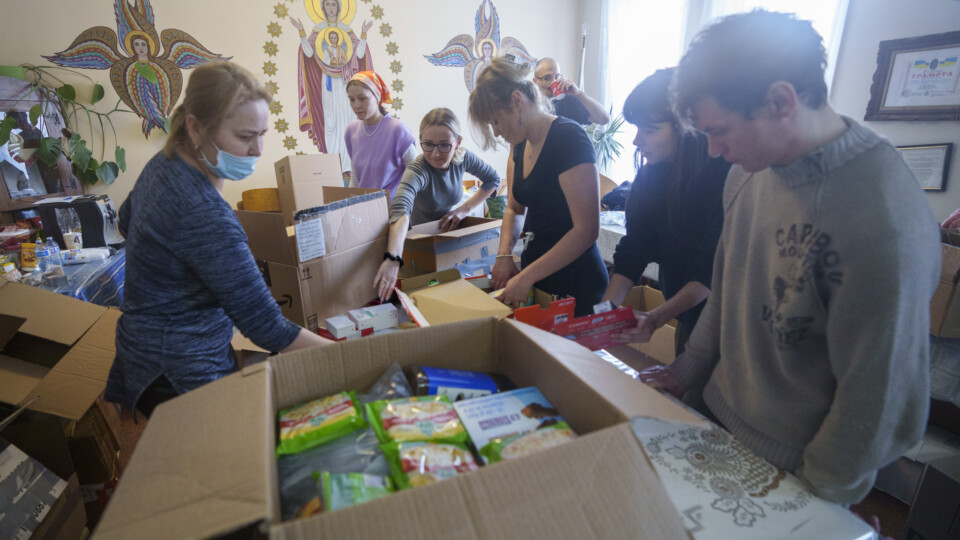
Volunteers pack boxes of donations St. Michael’s Ukrainian Catholic Church in Montreal, March 3, 2022. Paul Chiasson/The Canadian Press.
Volunteers pack boxes of donations St. Michael’s Ukrainian Catholic Church in Montreal, March 3, 2022. Paul Chiasson/The Canadian Press.
Canada’s charities count on our generosity during the Christmas season more than at any other time of the year. Given the recent postal strike (now thankfully over) and the continuing decline in charitable giving, organizations are likely facing one of their toughest years since the COVID economic slump. Reversing the drop in donations isn’t just a matter of seasonal goodwill or the resumption of mail service so that physical cheques arrive at charity offices; it will require cultural change.
Consistent charitable giving isn’t as much an action as a mindset. It comes from seeing the world through a “we” lens rather than a “me” lens. While not identical to religion, there is a strong correlation between personal religious commitments and the public good of charity. In our secularizing culture, this is easy to forget.
Consider that the well-documented, decades-long downward trend in Canadian charitable giving coincides with the drop in their religiosity. Cardus research shows that the proportion of Canadians attending church, temple, synagogue, or other houses of worship at least monthly dropped from 20 percent in 2017 to 15 percent in 2022—and is likely even lower today. While belief in God has bounced around in the mid-to-high 60 percent range over the same period, Canadians’ religious identity has grown weaker while we’ve become more religiously uncertain.
This doesn’t seem to be a mere correlation. Imagine Canada has found that more than nine in 10 of all Canadian charitable donors in Canada were weekly attenders of religious services. Weekly attenders were also, by far, the most generous donors.
Two former senators who’ve studied the charitable sector, Terry Mercer and Ratna Omidvar, saw more than mere correlation between religiosity and charitable giving.
“So many people are asked to give when they go to their church, or their synagogue, or their temple, and that’s the basis on which they learn philanthropy,” Mercer said in 2019. “It’s the basis on which they learn the shared responsibility to the need.”
Omidvar echoed Mercer’s point when she noted that “churches in Toronto house the homeless” while “gurdwaras feed the hungry.”
“I think that we need to recognize that religious institutions do more than simply preserve their religious beliefs; they extend themselves in very significant ways,” she added.
Religious belief, of course, is very personal. What individual Canadians believe or don’t believe, and whether they attend religious services or ignore them, are personal decisions. There is no role for any government there. So, of course, governments shouldn’t be in the business of promoting or encouraging religion. (This is something that hasn’t happened in Canada for several decades at least, in any case.) Likewise, governments shouldn’t be in the business of officially banishing religion from the public’s view and shuffling it off behind closed doors. This is something we see currently in Quebec, for example. This secularist cultural instinct actually hurts everyone.
However, governments can and should play a role in facilitating Canadians’ charitable endeavours, many of which have a religious motivation or mission. More than that, governments and political leaders would do well to follow the examples of retired senators Mercer and Omidvar in explicitly and publicly recognizing how participation in Canada’s religious communities serves the common good.
In fact, governments at all levels—especially municipal ones—need to stop flirting with the idea of taxing churches or other religious congregations. A recent Cardus report found that, measured in dollars and cents, what religious congregations give to their communities is worth almost 10.5 times as much as the tax exemptions and credits they receive. Those findings are based on religious congregations’ Halo Effect, which measures the dollar value of their social and economic contributions to society. These contributions include providing space (often at below-market rates or for free) for other groups to hold events, running addiction recovery programs, sponsoring and settling refugees, and offering meal programs or food banks.
Canada’s religious congregations collectively have an estimated Halo Effect of around $18.2 billion annually, while their tax exemptions and credits come to an estimated $1.7 billion. This means religious congregations make a net positive $16.5 billion socio-economic contribution to Canada. There are more important measures of their contributions, but this is the easiest to quantify.
Christmas’s association with giving is no coincidence. The gift-giving, charity work, and feelings of hope stem from the Christian origins of the holiday: the celebration of God’s gift to humanity through the birth of the promised saviour, Jesus Christ. However commercialized the holiday may be today, Christians celebrate Christ’s birth, in part, by replicating God’s gift-giving and sharing their blessings with others. Similarly, other religious communities in Canada have their own motivations and impulses for charitable giving.
So, while we can and should recognize that many non-religious Canadians donate generously to charities, it’s important to recognize culturally that religion has a special, catalyzing effect on giving. In short, religion is a public good.
Merry Christmas.
Ray Pennings is co-founder and executive vice president of Cardus, a non-partisan think tank.
Ray Pennings is co-founder and executive vice president of Cardus, a non-partisan think tank.
Already a subscriber? Login
The Hub is a project of Hub Canada Media, a federally incorporated not-for-profit.
GOLD Corporate & Industry Council Members:
